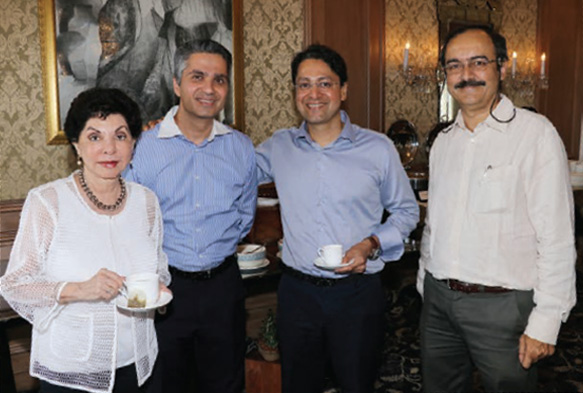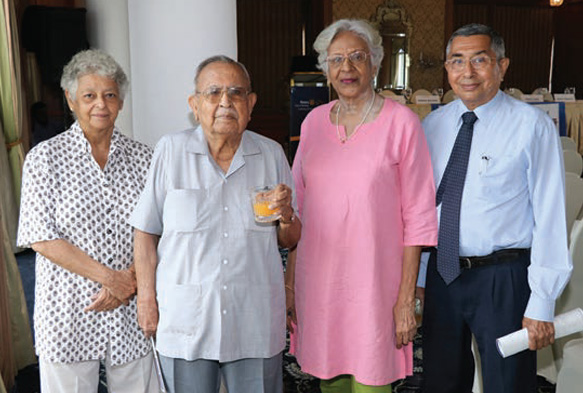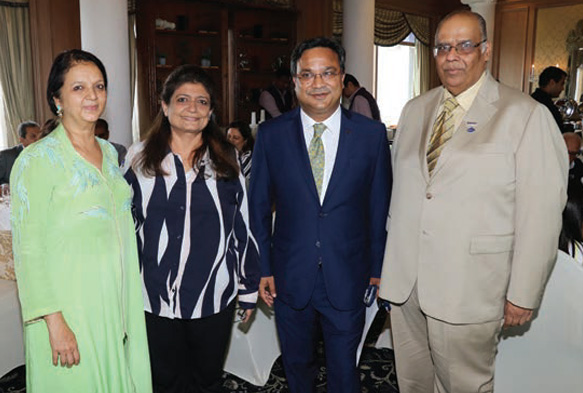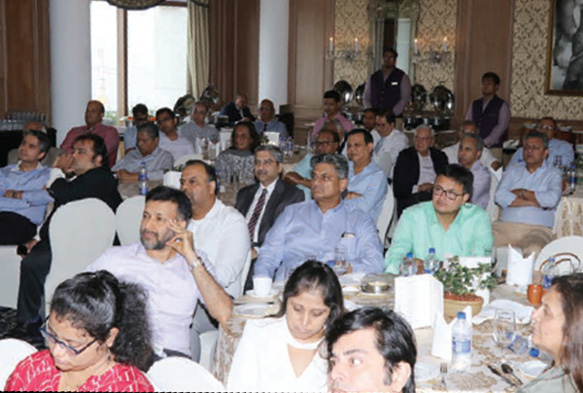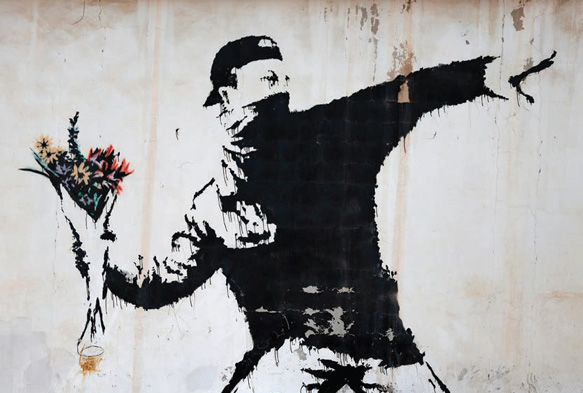
WAGING PEACE
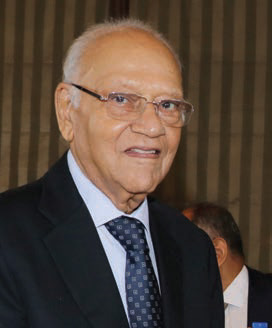
Last Tuesday’s speaker, former Mumbai Police Commissioner, JULIO RIBEIRO talks about conflict resolution in Punjab, Kashmir and Mumbai. Ribeiro was awarded the Citizen of Mumbai Award at the Rotary meet
“The policy now being applied in Kashmir will fail; this is my view. I have written that muscular power in Kashmir will only produce more terrorists and that is what is happening.”
“I have dealt with terrorism first-hand in Punjab. Before Punjab, my experience was in dealing with the underworld – that is what Mumbai taught me. Communal issues are, of course, another matter.”
“When I was asked to go to Gujarat to solve the communal problem there, it was easy. I think I did that in less than four months. As for Punjab, the Prime minister told me, ‘That will also take you four months’. I remained there for nearly four years and nothing happened. It went on and on and later on they had to recall Mr. Gill to solve it. He says he solved it, though I don’t think he did and I’ll tell you why:
“Terrorism is of two types. One is intellectual, ideological terrorism that you find in Italy, Germany and which is confined to universities. But there is also the nationalist form of terrorism which we saw in Ireland for 200 years and which was never solved. It is comparatively peaceful there now but I hope it survives.”
“In the nationalist form of terrorism, you find that people are killed for belonging to a different community and in order to cause terror. For example, in Punjab, terrorists would shoot at Hindus gathered for jagrans or in RSS shakhas. There were demands we should place troops there which we did. Then the terrorists attacked some other place.”
“We made a list of all the big terrorists we knew about and went after them by either capturing or eliminating them. But the death of one terrorist would give birth to another three. We had a list of a hundred and thought that ridding half of them would leave 50 to see to but instead the number doubled.”
“I went to Ireland and met the chief constable, John Herman, and shared the trouble we were facing. He said this was his experience too. He also said there was no point eliminating terrorists because it was an emotionallycharged problem; it was the community that was getting emotionally-charged.”
“Of course, there is a difference between Kashmir and Punjab. In Punjab, I don’t think most of the terrorists subscribed to the Khalistanis but here, I think, it is almost complete. There is a direction towards joining the movement or sympathising with it. The masses don’t join in the activity but support them tacitly. This tacit support gives them the oxygen to continue. This is a low-cost form of a war. No party takes to terrorism when they are able to fight the state. When they are not able to fight, when they become weak, they take to terrorism which is a low-cost war. But no country in the world, even a small one, has ever succumbed to terrorism. There is no chance India will succumb either. It will go on and on.”
“When I returned from Romania, Mr. Vajpayee was the PM and within the first week of taking over, he phoned me to ask if I would be the Governor of Jammu and Kashmir. When I asked to be excused, he wanted to know why and called me to Delhi. I explained that it was not possible for a Governor to go out and meet the people and that was what was required to get the people of the community to which the terrorists belong, on your side. As a DGP, I could do that.”
“I had an assistant called Chaman Lal in Punjab, a very fine officer, one of the best I have seen in the police force. He was from the Madhya Pradesh cadre and used to accompany me. He was loved by the people because he was humane. He tried to tell them, ‘You are Sikh; Sikhs don’t kill innocent people, they defend them’. And, they became closer to us in that way.”
“We went to so many villages. Each time, we called neighbouring sarpanches and addressed crowds of 200 people. I don’t have a count of the number of meetings we held just to get people on our side. Gill felt that this strategy was becoming soft; he complained to the Governor that we were making his work difficult. But this is not a soft approach. I explained to the Governor that the classical form of combating terrorism of a nationalist form is to get the people of that community on your side. He understood but said that Mr. Gill was the DGP and he had to be given full powers, and that we should not interfere. So I withdrew Chaman Lal.”
“When 26/11 happened here, I flew to Delhi to meet PM Manmohan Singh. He was very happy to hear from me; we knew each other since the Punjab days. I reminded him what we had done in Punjab and how the people had come over to our side; I said this should be done in Mumbai too where I started the Mohalla Committees movement to get communities together. We may not get them at leadership levels because leaders want to continue their leadership. But it is the foot soldiers, the people living in slums, who kill and get killed in return. I told him we must get those people over to our side. How do you do it? By giving them the respect and dignity they deserve as citizens of this country. That
is what is lacking.”
“Mr. Manmohan Singh understood. Even before I reached Mumbai, he had already phoned the Chief Minister Ashok Chavan and asked him to listen to what I had to say. So, when I reached the airport, there was the CM’s car waiting for me.
He brought a whole lot of bureaucrats, all of whom took notes furiously but nothing was done after that. They are very good at pretending or maybe they think they have their own way; perhaps they don’t know how to get people on their side.”
“This is why the present muscular policy in Kashmir will not work. I have written about it and I thought that the Prime Minister, at one stage, thought of going out and making the locals more friendly towards the government. But that requires much more than just giving them sops. Sops are not going work. What is required is to treat them as equal citizens and show them the type of compassion that they are entitled to. Unfortunately, we have put the Army on their backs. The Army is not really cut out to deal with local issues. They are trained for the external enemies, not internal ones.”
“Internal enemies have to be dealt with by the police and administration who have to continuously talk to the people and make them feel that they are respected citizens of this country. This is a view shared by many young officers in J&K today. They have been writing about it. Others feel that the only way of teaching them a lesson is to give them a good beating. I don’t think a good beating is going to solve the problem of Kashmir. Kashmir is a much more difficult problem than Punjab and in Punjab the Jat Sikhs, who mainly form part of the terrorist groups, we talk to them, and ask why they support terrorists. They say they are not fighting for themselves, they are fighting for the koum. They are not getting anything out of it. In fact, they are living life without a family, without the basic ordinary luxuries we enjoy and yet they are fighting. We have to respect them for that. It is worse in Kashmir because religion is involved. I didn’t find the religious bias dominant in Punjab.”
“I recently read that the ISIS has decided to have a cell in this part of the world. They have lost in Syria, so they assume this is the most fertile ground in south Asia. I think many things have happened in the last five years where the Muslim population in particular has been under great pressure. For example, the meat trade has been completely demolished and which has incidentally also affected the Hindu farmer because he doesn’t know what to do with his cattle. Even in Maharashtra, small farmers are now hiring tractors. What will happen to the milch cattle, I don’t know. These are some of the problems we are going to face and I presume we will find solutions.”
Alternative businesses have to be created and concessions have to be made. The fact remains that we have to take people along. Any muscular form of approach is not going to help, you have to get the terrorists’ community on your
side.”

